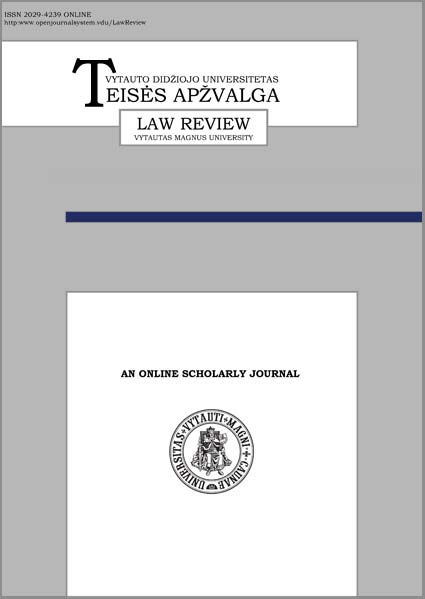Mokesčių slėpimas kaip nusikalstama veika: sisteminė normų analizė ir aktualūs taikymo klausimai
Tax Evasion as a Criminal Offense: Systematic Analysis of Norms and Important Issues of their Application
Author(s): Oleg FedosiukSubject(s): Law, Constitution, Jurisprudence, Criminal Law, Law on Economics, Public Finances
Published by: Vytauto Didžiojo Universitetas
Keywords: Tax Avoidance; Tax Evasion; Presentation of False Data on Income; Profits or Assets; Deceptive Accounting; Illegal Enrichment; Pursuit of Illegal Economic Activity; Smuggling; Customs Deceit; Fraud;
Summary/Abstract: The article “Tax evasion as a criminal offense: systematic analysis of norms and important issues of their application” analyzes the legal concept of tax evasion and its equivalents in the system of special part of criminal legislation. The author, emphasizing subsidiarity of criminal law in relation with the tax law, assesses the quality and consistency of relevant norms of criminal code, rationality of criteria to criminalize various forms of tax evasion, discusses the ways to improve the legal regulation, draws attention to the issues of qualification of tax offenses illustrating his conclusions by reference to the relevant precedents of the Court of Cassation. The author draws attention to the lack of Criminal Code regulation, which by misunderstanding uses the notion of tax avoidance instead of tax evasion, while in the Code there is a whole chaotic set of tax evasion corresponding norms, which are scattered in different sections. This collection contains both the articles set out in the chapter of offenses against financial system (Chapter XXXII) and the articles defining offences against property, property rights and property interests (Chapter XXVIII), as well as offences against the economy and business (Chapter XXXI). The basic idea of the presented research is that the application of criminal liability for tax violations and their delimitation from non-criminal activity of tax payers must be based on classification of tax burden reduction adopted in the tax law. In other terms, the criminal justice must be able to distinguish between tax optimization, tax avoidance and tax evasion, as well as to ensure that criminal liability would be applied only for the illegal tax burden reduction which corresponds to the concept of tax evasion. Very important are also criterions of delimitation of the criminal and administrative liability for tax evasion, paying special attention to their clarity and rationality. The author is critical of the existing criminal legal regulation, according to which offences corresponding to the concept of tax evasion are scattered in different chapters of criminal legislation, are not compatible with each other and based on different legal logic. The author criticizes also the provision of article 220 of Criminal Code under which € 380 evasion is sufficient to result in criminal liability. According to the author, this size should be 25 times higher, while the existing criterion is inconsistent with the Code of Administrative Offenses. The author also criticizes part 1 of article 202 of Criminal Code, which establishes the criteria of criminal liability for illegal economic activities, one of them (entrepreneurial way) is very vague and naturally inherent in any business. This complicates the issue of criminal and administrative responsibility delimitation and creates favorable conditions to carry redundant criminal proceedings for minor violations. The article critically evaluates also the norms on deceptive and negligent accounting, in which the criteria of criminalization are extremely abstract. The author also advocates the need for a total decriminalization of negligent accounting as incompatible with the purposes of criminal legislation. The article also criticizes the definition of illicit enrichment which lacks the legal logic and rationality. According to the author, the criminality of illicit enrichment (art. 189(1) of CC) should not be associated with the value of the assets held, but to the value of concealed income from such assets are acquired. The article expresses the idea that criminal punishability of all tax evasion offenses must lead to the same criteria – the value of concealed or attempted to conceal taxes and income. All such tax evasion norms should be included into the financial crimes section of criminal legislation.
Journal: Teisės apžvalga
- Issue Year: 2017
- Issue No: 2(16)
- Page Range: 59-76
- Page Count: 19
- Language: Lithuanian

